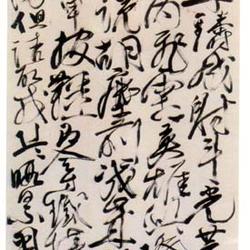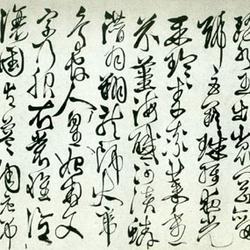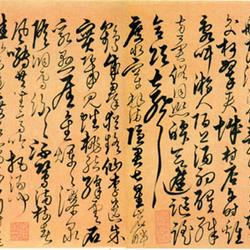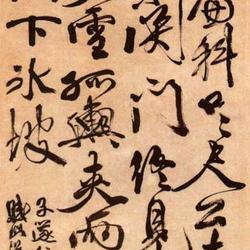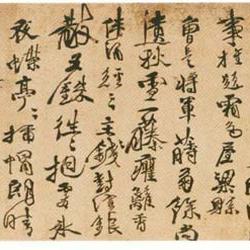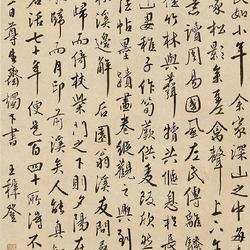
Xu Wei of the Ming Dynasty and "The scroll of running cursive and chanting ink"
(Text/Tang Jianchu, scanned from Zhejiang People’s Fine Arts Publishing House’s Essence of Chinese Dharma Calligraphy Series)
Xu Wei (AD 1521-1593), also known as Wen Chang, was also known as Tianchi Shanren. In his later years, he was known as Qingteng Taoist or signed as Tian Shuiyue. A native of Shanyin (now Shaoxing). At the age of 20, he was a student in the city. He repeatedly failed in the provincial examinations. He once visited Hu Zongxianmu, the governor of Zhejiang and Fujian. He was famous for his draft "Xian Bailu Biao". He was involved in many plans for the anti-Japanese army. He knew military affairs and was curious about plans. Hou Hu was impeached and imprisoned for being one of Yan Song's accomplices. Xu Wei was driven mad by the misfortune and committed suicide, so he killed his step-brother and was imprisoned for seven years. Zhang Yuan of Tongli was saved by force. In his later years, he was destitute and exhausted, so he made a living through poetry, calligraphy and painting. Xu Wei has been extremely intelligent since he was a child. His genius is both eccentric and cynical. His poetry and prose are unparalleled among his peers. It is said that he has the distinction of Li He and Su Shi. place. He is good at painting things and specializes in flowers. He uses his pen freely and freely, and his ink is vivid and hearty. He creates original ideas. Together with Chen Daofu, he is called "Ivy Baiyang" and has a great influence on later generations of freehand flowers. Calling myself "I
"The first calligraphy, the second poetry, the third text, and the fourth painting." His calligraphy is good at cursive writing, written by Mi Fu and Huang Tingjian. His writing style is round and calm, bold and unrestrained, and does not follow the rules. He is a representative of the great calligraphy circles in the late Ming Dynasty. Yuan Hongdao of the Ming Dynasty "Zhong Lang" Comments on his calligraphy in "Collection" say: "Wen Chang likes to write books, and his writing style is as bold and unrestrained as his poems. His vigor and grace stand out, surpassing Wang Yayi and Wen Zhengming. Regardless of calligraphy, as for the god of calligraphy, he is the San Sheng of the Eight Methods of Cheng, Zi Lin. He is also a knight. " His writings are numerous and miscellaneous, including poems and essays "Xu Wenchang Collection", "Xu Wenchang's Lost Manuscripts", "Xu Wenchang's Lost Grass", opera treatise "Nanci Narrative", dramas "Four-Voice Ape", "Song Dai Xiao", etc. There are also many annotations in the Three Teachings and Methods books.
Suzhou Museum collects Xu Wei's "Scroll of Ode to Chanting Ink Made with Running Cursives", on paper, 352 cm high and 102.6 cm wide. It is a huge piece of work and astonishing. Its calligraphy is sharp and angular, and it does not avoid failure. The stipples are fragmented, the structure is broken, and the layout is scattered. And the strong heart and iron bones, an upright and unyielding spirit, are clearly visible. In terms of legal standards, this scroll of calligraphy can be ridiculed as "Wild Fox Zen" or the like, but from the perspective of the essence of "the calligraphy is like the person", "the calligraphy is the voice of the heart", and the reason why calligraphy is "beautiful things move people", this scroll of calligraphy expresses The turbulent mood, intense emotions, and wild talents wash away the pain in my heart. This is different from the sadness, indignation, depression, and depression in his later years: "It is difficult to stop enjoying it, and when you get happiness, you can enjoy it piecemeal; there is no end to the suffering, and you can stop talking about the extreme suffering." The helpless mood is consistent, so seeing the situation and seeing the nature, it is sincere and touching, and it is regarded as a divine product.
Paired with this scroll, Xu Wei's "Sword Sword Scroll Made with Running Grass" is also stored in the Suzhou Museum. When the two scrolls are hung between the walls at the same time, only paper clouds and smoke can be seen, and the walls are covered with thunderous waves, which makes the viewer's blood rush and can't help but feel emotional. Excited and racing with thoughts, there is always a sigh of relief.
"Yingzhi Yongmo" was sent to "Recalling the Flute on the Phoenix Platform", the poem says: "The Hou paid tribute to the pine trees, guarded the Chu County, and the crimson was of various grades. The dragon's agent rhinoceros glue was collected to accompany the lamp and smoke. . Practice according to the law, confirm and follow others, and then you can become the master of the old family. In what year, I fled the Yang family and returned to the side of Confucianism. The red silk jade plate is frosted, and the pain is measured, and I grind it carefully. Come and drip, It turns into a dragon in purple mist. Sometimes it transforms into the size of a fly, and then it changes into the clothes of a Taoist priest. To my emperor, the mountains shout long live, may you live forever in the sky." Strange thoughts and magnificent compositions, deeply influenced by emotion and nature.

